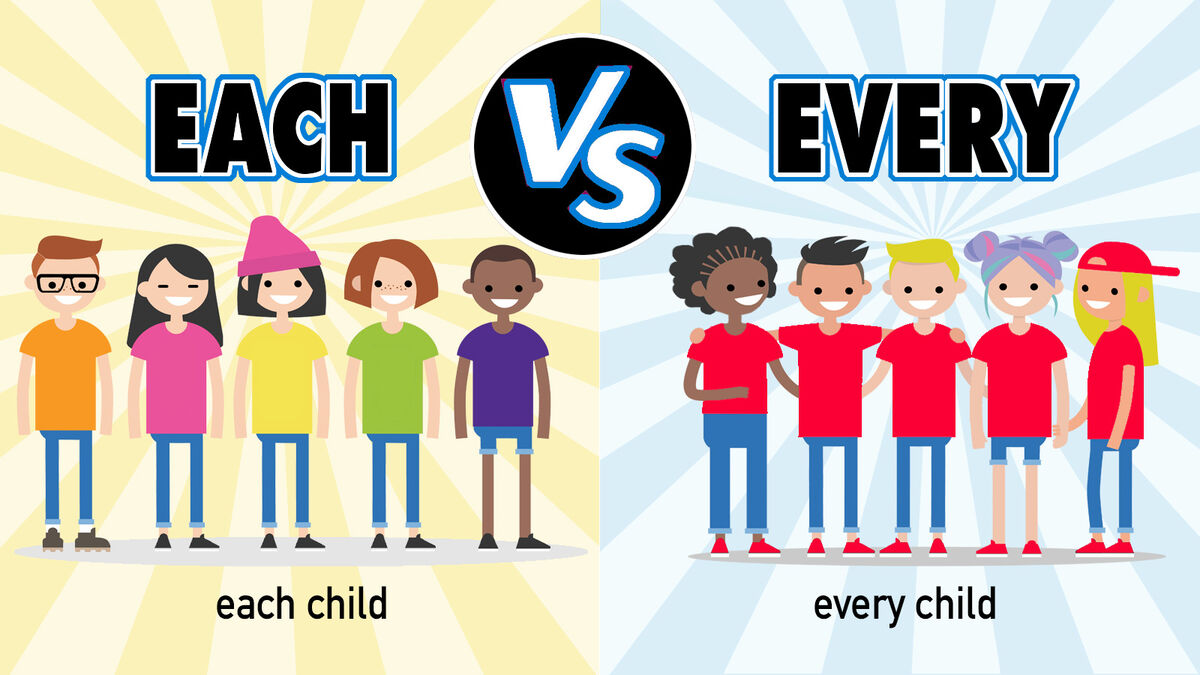
Knowing when to use “each” vs. “every” in a sentence doesn’t seem like it would be confusing until you try. Then, you might sit there wondering if you're using the right word. Clear up any confusion by getting simple explanations of the meaning and use of “each” vs. “every," including example sentences.
How to Use “Each” and “Every”
Before you can jump into throwing “each” and “every” in example sentences, you need to look at what “each” and “every” mean. While their definitions are similar, they aren’t the same. This helps you to see how the quantifiers “each” and “every” can be used differently in a sentence.
- Each is used when you are talking about an individual person or item in a plural group.
- Every is also used for a plural group, but the word is used to describe the collective group, not the individuals within it.
Check out how these small differences in definition can make an impact in sentences through examples.
- You must evaluate the opinion of each artist.
- Every artist has an opinion.
- It is important to fill out each application page.
- Every page includes important details.
- Tommy is using different pencils each time.
- Jerome is using the same pencil every time.
- Each child is performing a different task.
- Every child is performing the same task.
It’s a Numbers Game
Another clear distinction between “each” and “every” is that “each” can be used for two or more, while “every” is used for three or more. For example:
- She has a birthmark on each ankle.
- He has a ring on every finger.
- I put a bracelet on each wrist.
- She has a picture on every wall.
- The twins each have a teddy bear.
- Every triplet was holding a doll.
Beyond just being used to identify an individual or collective group, “each” and “every” can be used differently within a sentence or with specific words.
Individual Uses of “Each”
In addition to being used as a general qualifier in a sentence, “each” can be used as a pronoun. See how "each" will become a singular pronoun in a sentence.
- Bill and Ted gave each other gifts.
- We have three windows; each has a great view.
- The dogs are unique. Each has different markings.
- The men hit each other.
“Each” can also be used with plural pronouns. When used with plural pronouns, "each" isn’t becoming the pronoun but it is qualifying it.
- They were each holding a book.
- They each will go to the office.
- We each live in a different town.
- The town gave us each a metal.
“Each” isn’t the only word to have unique purposes in this duo. Find out the ways that only “every” can be used in a sentence.
Uses of “Every” in a Sentence
"Every” can’t be used as a pronoun. However, you don’t use “each” with adverbs like nearly, almost and practically. In these cases, the clear winner in the “each” vs. “every” word smackdown is “every.”
- Nearly every book I need is checked out.
- Practically every car has been rented.
- He does this almost every time.
- Practically every time we go to leave she has to pee.
- You are late almost every day.
“Each of” vs. “Every One of” Usage
While you can say “each of,” it makes no sense to say “every of.” With "every," you have to add "one" to make “every one of” instead. Both of these phrases will be used with an object pronoun.
- Each of the students was holding a book.
- Each of you will be going to the office.
- They needed to talk to each of us.
- The school gave each of the winners a plaque.
- Every one of the tourists has a bag.
- You have to make sure every one of the kids gets on the bus.
- Every one of us is insured.
- You better check every one of them.
You'll notice that every word that follows the "of" is plural, like "the students" and "the tourists," but the corresponding verb is singular. That's because the subject-verb agreement works with the word "each" or "one," and not "the students" or "the tourists." Each was holding a book. Every one has a bag.
And now, you’ve made it through the “each” vs. “every” battle. Let that sink in for a minute.
Each, Every, Oh my
When it comes to “each” and “every,” they have a few subtle differences and unique situations where each one should be used. Now that you know the rules, you can try them out on your own. But before you leave, you just might want to expand your mind through finding out what a noun is and why it is so important in your sentence.